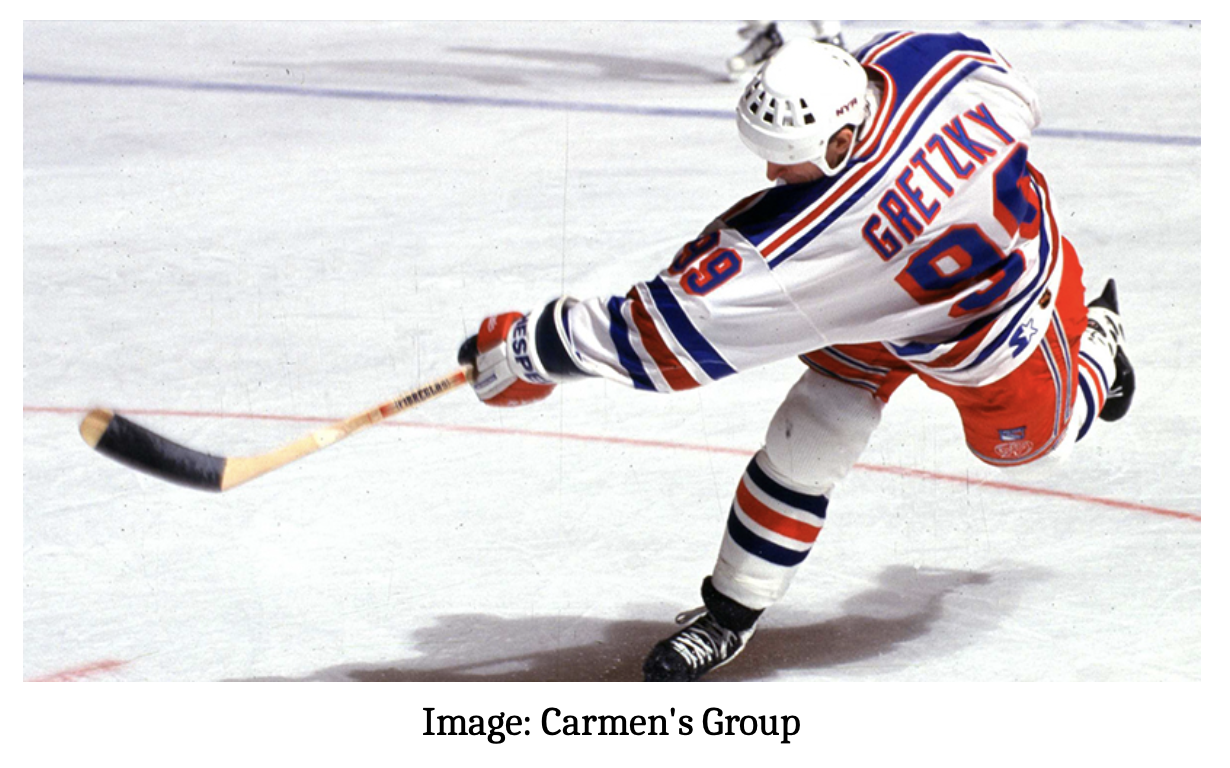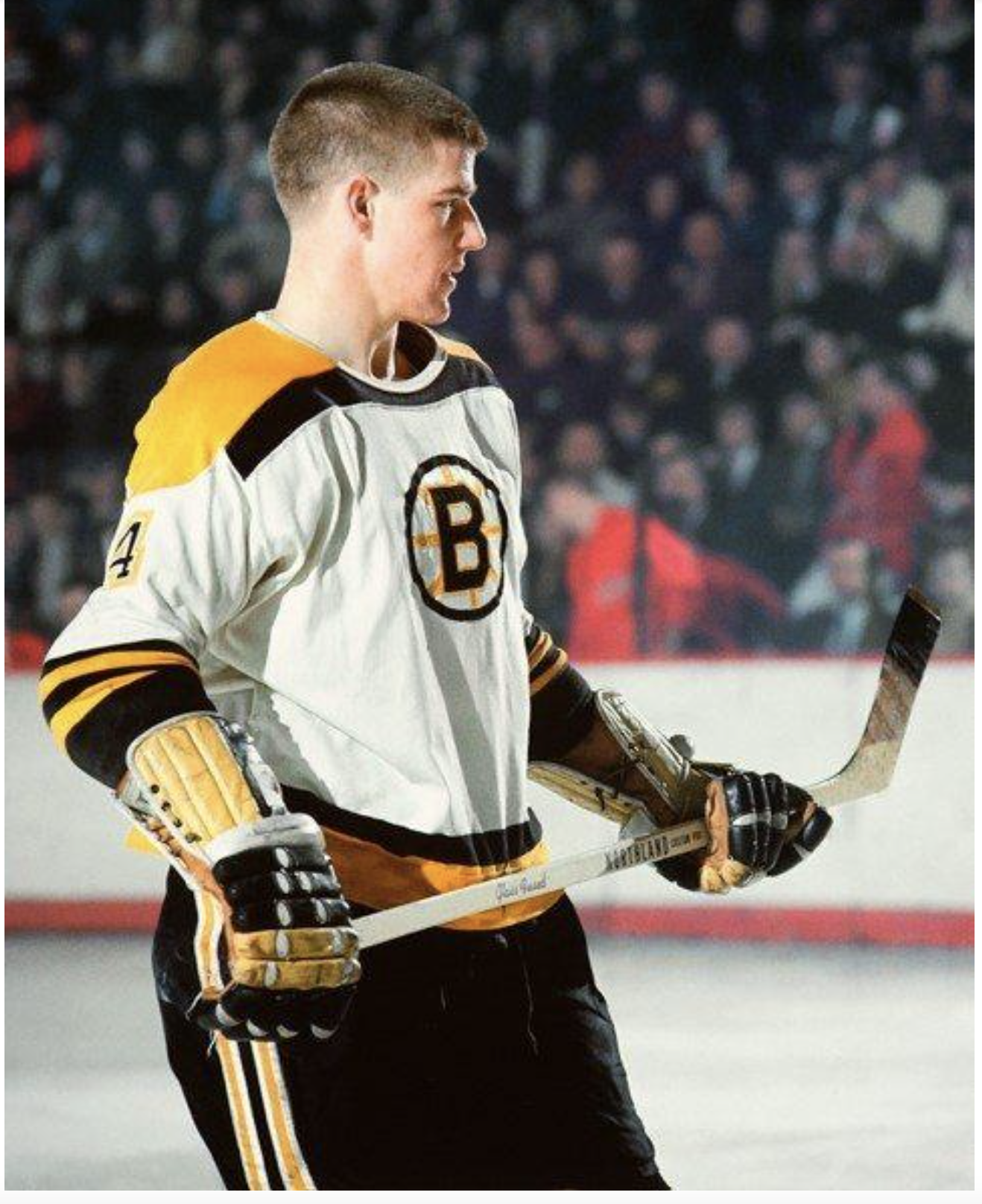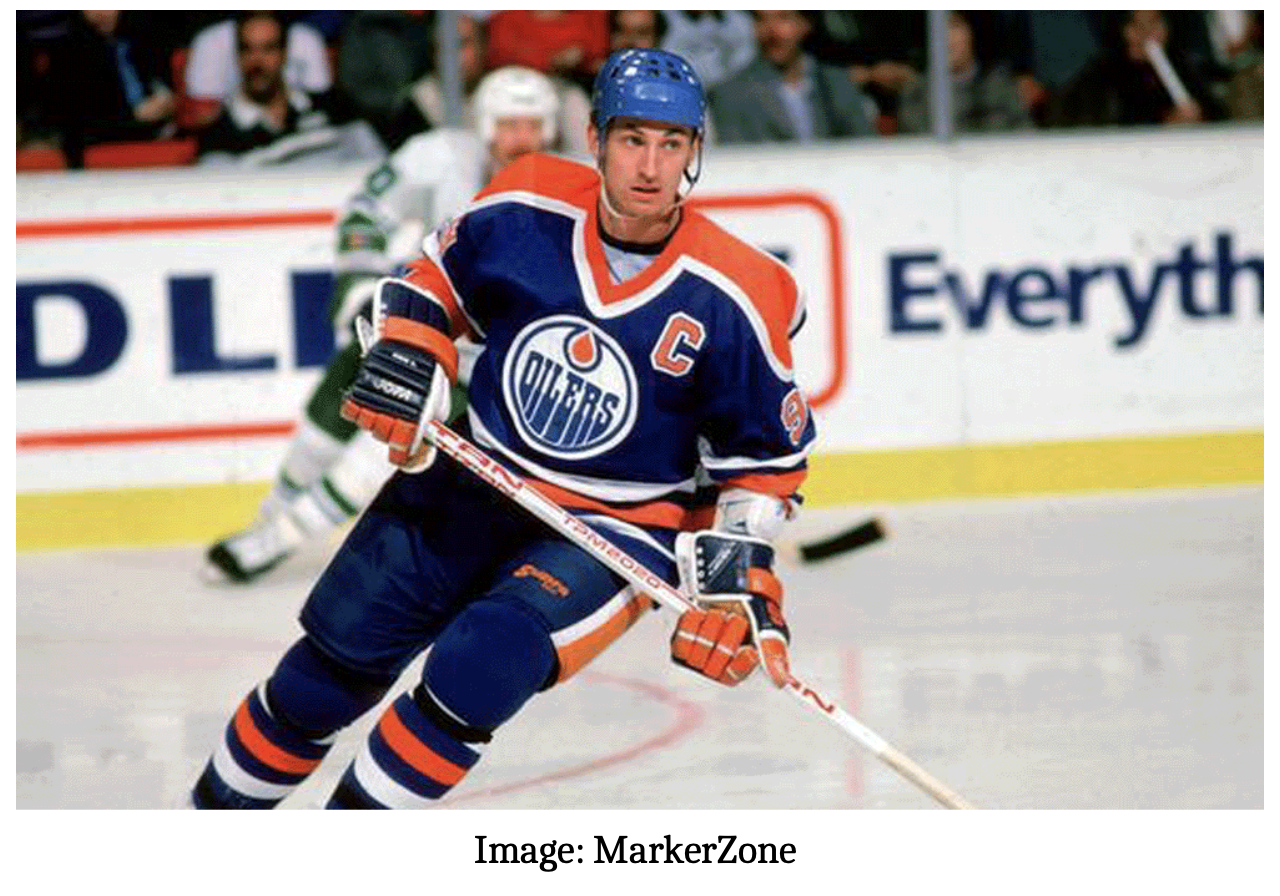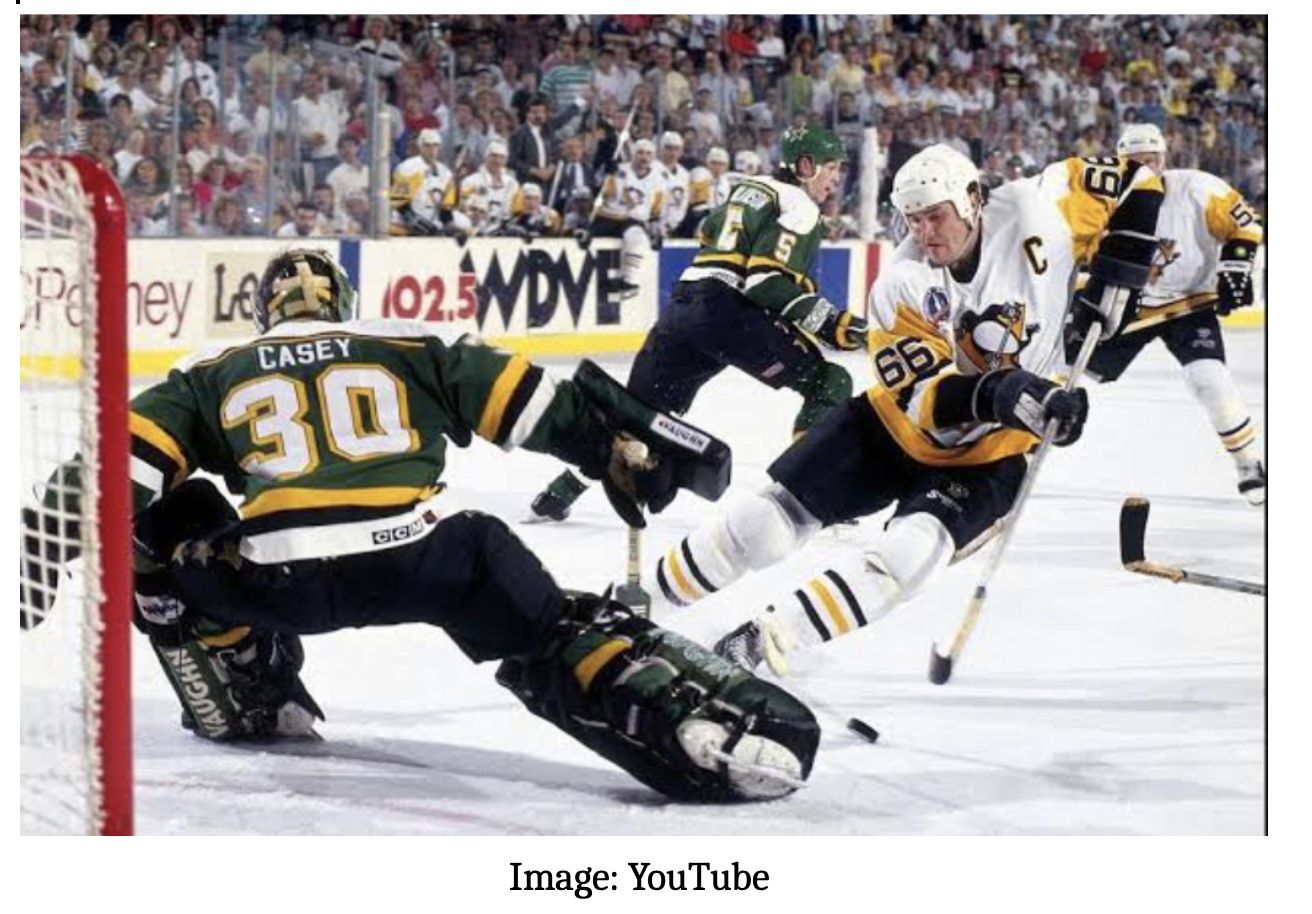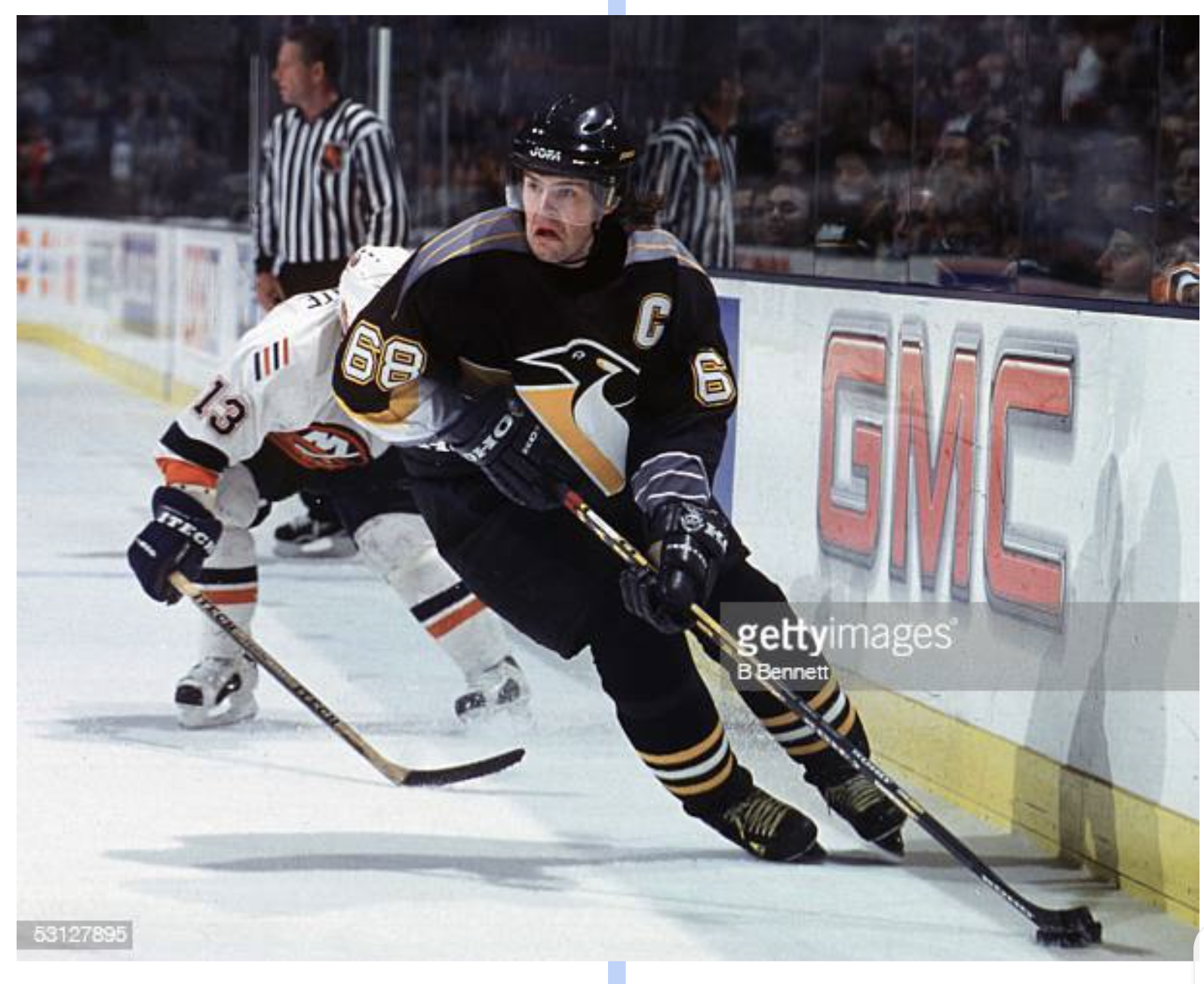A & N’s ® Top 100 Hockey Players of all time
Written By: Noah T. Clendenen
Stats & Editing By: Abbas Abdulrasool
© 9:01am November 30th, MMXXI
© A & N Sports, Est. 2021
Published by: Dr. Tee Scouting, Est. 2020
THE GREATEST
OF THE GREATEST OF ALL TIME
(Tier 1)
Image Credit: Gear Geek
No. 1, Wayne Gretzky, C, Edmonton/Los Angeles/NY Rangers/St. Louis
9x Hart, 4x Cup, 2x Smythe, 10x Art Ross, 15x All-Star, 2,857 Pts, 1,963 Gp
The great one is undoubtedly the great one in our mind, and is as well the goat of statistics, and awards as he is just in general. Unlike football, and basketball, hockey has its goat, but it’s greatest player of all time is quite frankly, probably the greatest at literally everything. Besides keeping the puck out of the net of course, and being a force defensively, Gretzky is currently holding 61 total records, with 40 being regular season related records, 15 being playoff related records, and 6 being all star game, and all star performance related records. It’s hard to find out Grezky’s greatest season on paper, but you have to go with his 1985-86 season where he put up numbers of 52 goals, 163 assists, 215 points in 80 games played, for a 2.68 points per game over the entire season. That’s by far the best mark in history, and best scoring season in general. That can only be compared to his 1982 season in which he had 212 points in just 80 games for the Oilers. Gretzky is perhaps most known, except of course for his numerous records, for his tenure with the Edmonton Oilers in which he won 5 total Stanley Cups in 7 years at one point. Not to mention, he also took home 7 straight Art Ross trophies at one point, and totaled 10 over his career. He also broke Gordie Howe’s record for most points scored by an NHL player in just his 11th season in the league, with 1,979, but he was far from finished. He would also have a shooting percentage of 20.3% over that entire stretch which means that on average, every 4 shots he would take, at least one of them would go in. That’s amazing! Now, I’ll only say the most important things, since I don’t want to fill up the whole article. Oh, and not to mention all 5 of his Ted Lindsay awards came in a 6 year stretch, 1981-82 to 1986-1987. He averaged nearly 1.92 points per game over his entire career, which is equal to about 157.4 points per season, with the next closest mark being Mario Lemiuex at 154.1. One more thing, Gretzky holds 12 of the top 20 highest scoring seasons in the NHL, with 8 of those being out of the top 10. No other player has more than 4, which Mario Lemiuex has, and everyone else, (Pat LaFontaine, Mike Bossy, Bernie Nichols, Jaromir Jagr, Phil Esposito, Steve Yzerman), all have just 1. His game changed the game, that’s all I can say.
No. 2, Mario Lemieux, C, Pittsburgh
3x Hart, 2x Cup, 2x Smythe, 6x Art Ross, 9x All Star, 1,723 Pts, 915 Gp
Super Mario is perhaps one of the most inspirational hockey players of all time, not just for his famous comeback from cancer, but just for his entire career in general. He was a super special player that is extremely overlooked in talks for the greatest hockey player of all time. If not for Jaromir Jagr, Lemieux probably would’ve won a Cup all by himself, that’s how good, and dominant he really was during the mid to late 80’s, (despite being overshadowed by Wayne Gretzky), and 90’s. He managed to take home 4 Ted Lindsay awards, and was also impressively the only other player to win the award in a 6 years stretch between the 1981-82 season to the 1986-87 season, with the other player being Wayne Gretzky. Lemieux’s best year was in the 1992-93 season, where he scored at an unbelievable rate, with 69 Goals, 91 Assists, 160 points in only 60 total games played. If he played the whole 82 game season, he was on pace for 218 points (2.66 PPG), not only breaking Gretzky’s record, but catapulting him to become a lock in the conversation for the greatest player of all time. While I do think he still has an argument, it would be much more competitive if he had that full season under his belt. Even if he doesn’t break the points record that season, he still eclipses 200 points, which is something that he failed to do throughout his career, getting as close as you possibly can get in 1988-89 with 199, with 85 goals, and 114 assists. But again, he missed time, playing 76 games, and missing out on a total of 6 games, which, let’s be real here, he’s gonna get 1 more point in 6 games, and maybe he even breaks the record, he was only 17 points away. With these two big “what-if” seasons, if those “ifs” become a reality, then he most definitely wins those extra two MVPs to go with his cups. Overall, I think Lemieux is one of the most underappreciated players the game has ever seen, but also a bit of a “if.” Don’t get me wrong, he was already a heck of a player, but if a few things went his way in his career, like injuries, and things that held him back, he could be a lot more of a serious contender for the best player of all time. But again, we have to be grateful for the Super Mario we did see, which was nothing short of fantastic.
No. 3, Bobby Orr, D, Boston/Chicago
3x Hart, 2x Cup, 2x Smythe, 9x All Star, 8x Norris, 915 Pts, 657 Gp
Arguably the greatest player of all time, Bobby Orr is without a doubt the greatest defensemen of all time, and it’s not really close. Orr was way ahead of his time, and was the inspiration for the more offensive defensemen that we see today, as well as the players that were inspirations for the offensive blue liners we see today, such as Paul Coffey, Brian Leetch, and Nick Lindstrom. Orr was the first defensemen ever to score 100 points in a season, and holds 5 of the top scoring seasons ever by one, with the other 5 going to Coffey. Orr notched 37 goals, a league leading 102 assists, 139 points, in 78 regular season games. It’s also worth noting that he had one of the best plus/minus’ we’ve ever seen, with the final number being +124. That’s the highest plus/minus ever recorded in NHL history, with the next closest being Larry Robinson with a +120. He took home the Norris, and the Hart this year, as well as being obviously named an All-Star. He’s also the most Norris Trophies ever won as well, with 8, and is second in Hart Trophies by a defenseman with 3, to Doug Harvey’s 4. Orr is also the only defenseman to ever win a Art Ross trophy for the league leader in points, as he did it twice over his career, scoring 135 points in 1975, and 120 in 1970. He's the second closest a defenseman has ever gotten to scoring 50 goals in a season, as he scored 46 in the 1975 season, which is second only to Paul Coffey’s 48 in the 1986 season. Not to mention, he even finished 3rd in Norris voting in his rookie season, at around a half a point per game which was the benchmark for many prime defensemen during that stage in the NHL. Orr revolutionized the game with his high pace, and offensive style of play, while also being one of the best defensive defenseman in the league. If it wasn’t for his consistent knee problems during the end of his career, he could well be the highest scoring defenseman over an entire career, as he was sitting at around 113.98 points per season when he retired. That means if he played the same amount of games that someone like Ray Bourque did throughout his career, (the current leader in all time points by a defensemen) he’d have approximately 2,110 career points. That’d make him only the second player ever to reach the 2,000 point mark in a career, and what’s even more impressive, is that he would’ve done that as a defensemen, (the only other being the great Wayne Gretzky)!
No. 4, Gordie Howe, RW, Detroit/Houston/Hartford
6x Hart, 4x Cup, 21x All Star, 1,850 Pts, 1,757 Gp
Mr. Hockey is the original goat, and the Tom Brady of hockey. My man played through nearly 5 decades of hockey, and played in at least 1 season in which one of those five decades were on the calendar year. He started his career in 1946-47, at the age of 18, and retired in the 1979-1980 season, at the age of 51. He’s even the only player to have played with his sons in the NHL, those being Marty, and Mark Howe who both had good careers on their own, but nothing like their fathers. His best year was during his 1968-69 campaign in which he turned 40 years old and still had the season of his life. Putting up 44 goals, 59 assists, 103 points, in 76 games, which none where league leading, however the fact that he joined Phil Esposito, and Bobby Hull as the only current players as of then to score 100 points in an NHL season at age 40, is arguably the most impressive NHL fact out there. He also finished top 5 in scoring 20 consecutive seasons, which is a major testament to his astonishing longevity. When he retired, he was the league leader in career points with 801 goals, and 1,809 points which at the time was a huge lead over second place, Jean Belliveau, who has 1,219 career points. When you look at his NHL, and WHA career combined totals, you start to see how good Howe really was, for such a long time. In 6 total seasons in the WHA with Houston, and New England, Howe racked up a total of 174 goals, 508 points, in 419 career games. When you combine the totals, his new career totals look like this: 975 career goals, 2,317 points, in 1,638 career games. Daggum! That puts Howe back in the lead for career goals, with 975, compared to second place with Gretzky’s total of 894. However, that creates a giant what if… would Gretzky have played into the 2000’s in order to break Howe’s record? But that’s for a different day. In all, Howe played 26 seasons in the NHL, and 32 total seasons of professional hockey, all of which were played in North America in the two best leagues in the world at the time. Howe will never be forgotten for his major impact on the game of hockey, especially since he’s the original player to make hockey one of the four biggest sports in the world.
No. 5, Maurice Richard, RW, Montreal
1x Hart, 8x Cup, 14x All Star, 966 Pts, 978 Gp
Image: Stimulated Faculties
Richard was the Howe just before Howe. The Gretzky before the Gretzky. Probably the NHL’s first ever “Goat,” Richard is most known for being the first ever player to reach the 50 goals in 50 games mark. Rocket Richard, as he’s more formally known, was, again, hockey’s first big superstar that really made himself well known throughout hockey history. He’s one of the best winners in the game, as he helped the Montreal Canadiens dynasty during the late 40’s, 50’s, and early 60’s to 8 cup wins, and even played a few seasons with his brother Henri “Pocket Rocket” Richard. Richard’s best season came during his 1944-45 campaign in which he famously scored his 50 in 50, and finished the season with 50 goals, 23 assists, and 73 points in 50 games. His highest scoring season was actually in his 1954-55 season where he scored 1 more point, with 38 goals, 36 assists, 74 points, in 67 games. He only won 1 Hart Trophy over his 18 year career with the Canadiens, but finished top 3 in Hart voting 6 times throughout his career. He also scored the most goals in the league 5 times, and didn’t win the Rocket Richard trophy for the league's goal scoring leader because it didn’t exist yet, since the reward is named after him. Richard’s speedy game made him the biggest threat to opposing goalies, and his skillset was extremely unwise for the time. Although not a consistent playmaker, Richard had the best shot in the game for the majority of his career, and arguably the best player in the league for a good stretch as well. This is even more impressive when you consider the fact that he didn’t start playing until the age of 14. For example, most hockey players start skating at the age of 2-4. Yeah, my man had some natural skill, and a lot of it. Richard is overlooked for the sheer number of fans that can say that they saw him play. That’s not a lot, given he played when hockey had just became a professional sport, as well as when the NHL had only 6 teams, and about one tenth of the fans that it has now, probably less. Richard was hockey’s golden child, and although people give credit to Gordie Howe, Richard was the best before Howe, and the player that made it popular enough for those superstars to play.
No. 6, Dominik Hasek, G, Chicago/Buffalo/Ottawa/Detroit
2x Hart, 2x Cup, 6x Vezina, 6x All Star, 389-223-95, 2.20 gaa, .922 sv%
Hasek is the best goalie of all time, end of discussion. Sorry Roy, Brodeur, Dryden, Sawchuk, and Hall, but the amount of disrespect that the Czech gets is otherworldly, for absolutely no reason. Here are some reasons why he’s better than Brodeur: number 1, he has more Vezinas with Brodeur finding his career with 4, and Hasek with 6. He has better numbers, with Brodeur finishing his career with total numbers of a 2.24 goals against average, and .912 save percentage, as well as a 691-397-154 record. Hasek on the other hand, has a career goals against average of 2.20, and a save percentage of .922, as well as a career record of 389-223-95, but he has played a lot less games over his career. Instead he had a 52% win percentage, with Brodeur at 54%.... so he was a slightly better winner. 2 for Hasek, 1 for Brodeur. Brodeur makes a comeback with 3 cups, to Hasek’s 2, but the tiebreaker is MVP’s, and how valuable, and impactful the player was to their team. Brodeur, although has had some very MVP caliber seasons, he has not officially won the award, nor the Ted Lindsay award given to the NHL’s MVP voted by the players. Meanwhile, Hasek is one of six goaltenders to ever take home the Hart, and the only goalie ever to win it twice, winning it in 1997, and 1998. He also took home the Ted Lindsay in both of these years as well just for reference. Not to mention, Hasek straight up outplayed Brodeur on the biggest stage with a much more well built team during the 1998 Olympics, in which Hasek led the Czechs to an upset win over the Canadians in the gold medal game. On a side note, Hasek’s best statistical season came during the 1999 season, where he led the Sabres all the way to the cup final, losing in 6 games to the Dallas Stars in one of the most controversial sequences the NHL has ever seen take place in just a matter of seconds. He averaged 1.87 goals against average that year, as well as sporting a .937 save percentage, with a 30-18-14 record. Although I’m definitely a little biased since I’m a Sabres fan, his brilliance can’t be denied.
No. 7, Jaromir Jagr, RW,
Pittsburgh/Washington/New York Rangers/Philadelphia/Dallas/Boston/New Jersey/Florida/Calgary
2x Cup, 1x Hart, 8x All-Star, 5x Art Ross,1,921 Pts, 1,723 Gp
Jaromir Jagr. The Moses Malone of hockey. The guy that’s still playing hockey despite being born in the year
Without a doubt the most impressive thing about Jagr is his longevity. He started his NHL career with the Pittsburgh Penguins during the 1990-91 season, at the age of 18, and officially ended his NHL tenure in 2017-2018 at the age of 45 with the Calgary Flames. The mullet man’s best season statistically, was during the 1995-96 season, where he, and Mario Lemieux combined for one of the most dominant duos in NHL history. He scored 62 goals, 87 assists, for 149 points in 82 games. He finished 4th in Hart voting that year, and cruised to an All-Star selection. Jagr’s combination of goal scoring, and ability to find open ice was unparalleled to anyone in the league, thus why he was such a great scorer.
No. 8, Mark Messier, LW/C,
Edmonton/New York Rangers/Vancouver 6x Cup, 2x Hart, 1x Smythe, 5x All-Star, 2x Lindsay 1,887 Pts, 1,756 Gp
Messier is one of the greatest leaders in sports history. As a centerman that could do everything better than anyone, Messier combined with Wayne Gretzky, and Paul Coffey to make probably the most dominant trio of players we’ve ever seen. Combining for a total of 437 points during the 1985-86 season, with 84 (35 G, 49 A, 63 GP) of those being produced by a young, overlooked, but yet talented Messier. His most notable, probably best season however, didn’t come in his highest scoring season. Yet, his best season arguably came during the 1991-92 season, in which he scored 107 points, 35 goals, 72 assists, in 79 games with the New York Rangers. On the other hand, his highest scoring season came in the 1989-90 season, where he tallied 45 goals, 84 assists, 129 points, in 79 games with the Oilers. He took home the Hart, and Ted Lindsay trophies, while also being named an All-Star. Messier’s playoff performance during that year’s Stanley Cup was probably what got him into the top 10 though. That year, Messier would famously guarantee a victory in game 6 of the 1994 Eastern Conference finals against the New Jersey Devils. He’d lead the Rangers to victory, and that momentum would end up showing, as the Rangers would win game 7, sending themselves to the Stanley Cup, and then defeating the Canucks in 7, giving the Rangers their first Cup since the 1940 season. Not to mention, he’d deliver the Stanley cup winning goal.
No. 9, Mike Bossy, RW, New York Islanders
4x Cup, 1x Smythe, 8x All-Star, 3x Byng 1,126 Pts, 752 Gp
Image: Pinterest
Bossy has one of the deadliest wristers in NHL history, and was great at putting the puck in the back of the net with it. Bossy is also one of the biggest what if’s in hockey history. Ok, I mean 10 great seasons in the NHL, fantastic. But still, give him 5 more seasons between 75 and 95 points, maybe a 100 point season in there somewhere, you could have a top 5 player of all time. But I mean hey, we still got to see one of the greatest, if not the greatest pure goal scorer of all time. Bossy only managed to play a total of 752 career games, and still managed to score 573 career goals, placing him 22nd in a tight goal scoring race. So let’s crank the numbers a little bit. Bossy was playing at a 0.76 goals per game pace throughout his career. That’s better than Alex Ovechkin, Wayne Gretzky, Brett Hull, Phil Esposito, the list goes on, and on. So that gives him a 62 goals per season ratio throughout his career, which is absolutely nuts. So let’s see, let’s just say he played 1,000 games on the dot, sounds fair. A rough, and I mean rough estimate would be about 1,000x0.76=760 so 760 career goals, give or take a few. So great. That ups his total even more, to now 4th all time. But let’s say he had the longevity of a serious competitor in the all time goals mark like Phil Esposito. He currently sits 7th in goals all-time, and okayed about 1,282 career games, so a good mark to estimate with Bossy. 1,282x0.76=974. Holy crud. Now look, it’s a rough estimate. Would he score 62 goals on average for like 8 more years? No. I mean probably not, but given how effective he was at finding open areas of the ice, and creating chances for himself, plus his shot being a great weapon on the power play, I still see him averaging over 50 goals a season. So even then, let’s try that. 82 divided by let’s just say 52 is 0.63. 0.63x1,282 is still 807. You see where I’m going with this? Anyways, besides that Bossy is a 4x Stanley cup champ, and was a part of what was one of the greatest dynasties in hockey history, pairing up with Bryan Trottier, and an extraordinary New York Islanders team to win all 4 in a row.
No. 10, Nicklas Lidstrom, D, Detroit
4x Cup, 1x Smythe, 12x All-Star, 7x Norris 1,142 Pts, 1,564 GP
Nick Lidstrom is another great defensemen that’s longevity proved monumental in how they’re looked at during today’s game. Lidstrom played a total of 20 seasons in the NHL, all with the Detroit Red Wings. Lidstrom put himself in the record books, by becoming the second place leader in all time Norris Trophy wins with 7, just 1 behind Bobby Orr for first place. He finished top 10 in Norris voting 17 out of the 20 years he was playing, and finished in the top 3 eight total times including the seven times he won the award. Lidstrom was an inspiration to all players that got to watch him play, and was one of the biggest European hockey icons of all time, becoming the first ever to win a Norris trophy in 2002. His best season came during the 2005-06 season, where he tallied 16 goals, 64 assists, for a total of 80 points in 80 games. Lidstrom is the second greatest defensemen to ever lace up, and it’ll be like that for a long time.
No. 11, Joe Sakic, C, Colorado (Quebec)
1x Hart, 2x Cup, 1x Smythe, 1x Lindsay, 3x All-Star 1,641 Pts, 1,378 Gp
The Burnaby, Ontario native was the 15th pick by the Quebec Nordiques in the 1987 draft, becoming one of the biggest draft steals of all time. Sakic is another one of the greatest leaders in hockey history, helping his quite literally stacked Avalanche rosters to 2 Stanley Cups. Sakic, the owner of one of the deadliest wristers in NHL history, scored a total of 625 goals in his NHL, which ranks him 16th all time, tied with Jerome Iginla. His best goal scoring year came in the 2000-2001 season where he racked up 54 goals in 82 games for 118 points. His best year in terms of overall production and performance came when he was 26 years old, in the 1995-96 season where he racked up 120 points, with 51 goals, and 69 assists in 82 games. That year he finished 6th in Hart voting, however, finished 1st in Stanley Cup Finals MVP voting, winning the Conn Smythe Trophy. The Sakic, Forsberg, and Roy trio was one of the most prolific in the league at the time. Two of the best players, matched up with probably the best goalie.
No. 12, Guy Lafleur, RW, Montreal/New York Rangers/Quebec
2x Hart, 5x Cup, 1x Smythe, 3x Lindsay, 3x Ross, 6x All-Star 1,353 Pts, 1,126 Gp
Lafleur, arguably the greatest French Canadian ever to lace up, (Mario Lemieux, Maurice Richard), spent a total of 17 seasons in the league with 3 different teams. Despite this, he spent the majority of his career with the Montreal Canadiens, and the end of their glory days in the early-mid 70’s, to the ‘84-‘85 season. Lafleur’s best season is without a doubt his 1976-1977 campaign, in which he tallied 56 goals, a league leading 80 assists, and a league leading 136 points in 80 games. What really stands out about this season is that he won the Hart, Art Ross, Ted Lindsay, and Conn Smythe trophies, as well as winning the Stanley Cup. For the cherry on top, he even managed to finish 3rd in Lady Byng voting. The “Flying Frenchman” was one of the league's best players for the majority of his career, and was the best for a lot of those as well. Lafleur, as you’ve probably figured out by now, had the one of the league’s finest pair of wheels we’ve ever seen. He was great at thinking the game, and getting himself into the right spots. With that, he totaled 1,353 points throughout his career, that mark currently sits 28th all time, and his mark of 560 goals currently sits 27th all time. His career mark of 793 assists currently sits 34th all time as well. Despite not being super high up on the career totals list, he has the 11th most goals ever scored by a right winger, and 7th most points by a right wing. He’s also tied for 3rd for the most Ted Lindsay awards with 3, with Jagr, Ovechkin, and Crosby.

